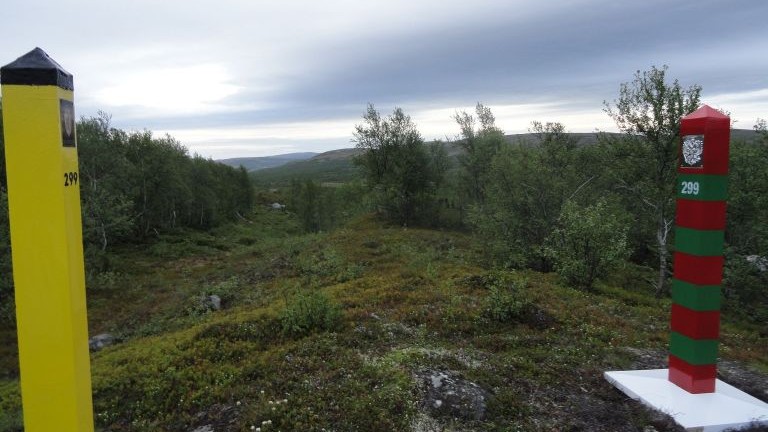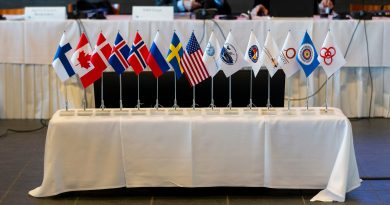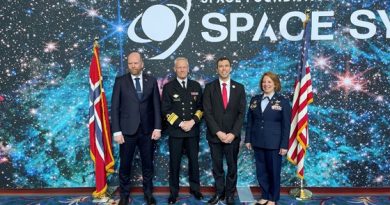Good Fences? Good Neighbours? The Diplomatic Travails of Norway and Russia

Compared with some of Russia’s other neighbours, the country’s border with Norway is relatively short, (approximately 196 kilometres), but from a political viewpoint this frontier has, of late, seemed much larger. The events of this year, including the pandemic and the continuing trend towards the increased militarisation of the Arctic, have contributed to a growing list of disagreements between Moscow and Oslo, which may have a spillover effect in other parts of the far north.
Norway, a member of NATO, has been trying to balance its regional diplomacy between maintaining stable ties with an erratic Russia, and addressing US-led concerns about the uncertain near-term security challenges in the European Arctic. Not helping matters are the numerous internal crises which occupy the government of Vladimir Putin, including some which influence his plans to develop the Russian Arctic as an economic powerhouse.
To say that this summer has been a difficult one for Moscow would be understating matters. The Russian economy has been hit by the double calamities of the coronavirus, (with total infections in the country reportedly nearing one million last week, amid ongoing scepticism about a recently announced Russian-made vaccine), and the collapse in global fuel prices. These issues have hampered plans to develop Siberia as a centre of economic growth and revival, as the region has also suffered this summer from embarrassing environmental damage and record-setting heatwaves.
The political situation in Moscow is also facing uncertainty, despite the successful adopting of constitutional amendments which would permit Mr Putin to remain in office until 2036. Russia is currently being bracketed by two slow-burning sets of civil unrest which, while not presenting a direct challenge to the government, nonetheless have served as unwelcome reminders of current vulnerabilities.
To the west, people’s protests in the neighbouring country of Belarus, sparked by an election in early August which was widely believed to be rigged, and subsequent dissent against President Alexander Lukashenko, have presented Moscow with a difficult question of whether or not to intervene, (and if so, by what means). The Russian government has expressed growing irritation with the Belarusian opposition, and President Putin dropped hints last week that he may be willing to lend security support to Minsk if the situation persists.
However, there is also the possibility, given cooler relations between the two governments since last year, that Mr Putin may wait out the Belarusian crisis, focusing instead on forging good relations with a successor government. Direct Russian military intervention to support Mr Lukashenko would be costly and risky and would almost certainly invite an international backlash at a time when Moscow can ill-afford such a response. However, the Putin government is also unwilling [paywall] to see Belarus, a country which Moscow has long viewed as part of the Russian ‘near abroad’ (Ближнее зарубежье) to tilt significantly to the West.

To the east, anti-government demonstrations in the Russian Far East, centred on the city of Khabarovsk (Хабаровск) have also been a thorn in Moscow’s side since July after the governor of Khabarovsk Krai, Sergei Furgal, was forcibly ousted and placed under arrest for allegedly being tied to murders committed approximately fifteen years ago. The move was widely seen by locals as a direct attempt at political interference by Moscow, and protestors took to the streets not only in support of the governor but also to express their anger at the central government in Moscow. Although these protests have largely been contained to the eastern edge of the country, there have been some public expressions of solidarity between the demonstrators in Khabarovsk and the opposition movements in Belarus, and protests in the city show no signs of slowing down.
Another apparent sign of growing strains within the Russian government took place earlier this month when longstanding Russian opposition figure Alexei Navalny became ill on a flight from the Siberian city of Tomsk (Томск) to Moscow, and was later transported to Germany for medical treatment following suspicions that he had been poisoned.
Political convulsions in Russia in the past few months have begun to be felt by Norway with increasing regularity. In early 2020, Russia had begun to push against what it perceived as Norwegian government overreach in Svalbard, which is governed by Oslo but subject to a treaty which allows for foreign (non-military) access to the archipelago. Russia is a signatory of the Svalbard Treaty, which observed its centennial earlier this year, but Moscow has stepped up its criticism in the past few months of what it considers discriminatory policies by Oslo which have restricted Russian interests, including fishing activities, in the islands. The two governments have verbally clashed over Norway’s fishery protection zone off of Svalbard, which the Russian government sees as contrary to the Treaty. The Putin government protested the detaining of a Russian fishing trawler in the area, in April this year, for allegedly violating the zone.

Stresses between the two governments over the Svalbard region may also be affected by an announcement last week that the Norwegian government was seeking to open up new maritime blocks in the Barents Sea between the northern Norwegian coast and Svalbard, including in areas close to the Russian maritime border. The dividing line between the Norwegian and Russian parts of the Barents had been disputed until an agreement [pdf] was struck in 2010. The news of the potential expansion of oil drilling further north in the Arctic provoked a negative response from environmental organisations, noting the potential damage which would be caused by an oil spill, (and with the current fuel leakage off the coast of Mauritius providing a grim case example). As well, this decision may prompt Moscow to further question Oslo’s Arctic policies, and the integrity of the Treaty.
On the actual Norwegian-Russian border, there have also been signs of trouble, linked to Moscow’s ongoing policies of augmenting its Arctic military presence. The border has been closed [in Norwegian] since March of this year due to the pandemic, and this month there have been reports that Russia is seeking to build a tracking facility, featuring a Resonance (Резонанс)-class radar system, near the border town of Zapolyarny (Заполярный). Plans were confirmed in March of this year that a new Norwegian radar installation [in Norwegian] was to be built near the frontier town of Vardø. Existing Globus radar facilities also around the Vardø environs had been subject to mock attacks by the Russian Air Force, dropping an unsubtle hint that these facilities would be early targets in the event of a conflict.
Also this month, Russian news services reported [in Russian] on an encounter between a P3-C Orion aircraft operated by the Norwegian Air Force and a Russian fighter jet over the Barents Sea near Russian airspace. While the Russian media had described the event as an ‘interception’, the Norwegian military stated that it was a routine encounter. The incident took place in the wake of a number of military activities [in Norwegian] along the Norwegian coast, including joint manoeuvres between the Norwegian and American air forces, and the unexpected surfacing of the US Naval submarine USS Seawolf off the coast of Tromsø.

The US military announced this month that it would soon discontinue its rotation of US Marines in Norway, a programme begun in 2018. This would appear to be part of a larger and controversial plan recently announced in Washington to reduce the overall number of US military personnel in Europe. The American President had contacted Norwegian Prime Minister Erna Solberg in June this year expressing concerns over what he saw as insufficient defence spending for a NATO member adjacent to Russia. As well, outgoing American Ambassador to Norway, Kenneth Braithwaite, during his May 2020 testimony [pdf] to the US Committee on Armed Services, was also critical of a perceived too-light approach by Oslo to the challenges of both Russia and China, comments which received criticism [in Norwegian] back in Norway.
Yet, there remains the question of whether the departure of US marines from Norway will have a significant effect on Russian views of the strategic relationship between Oslo and Washington. As one recent interview [in Russian], a Russian Foreign Ministry representative suggested there is little expectation in Moscow that military cooperation in the Arctic between the US and Norway will abate in the near future.
On the diplomatic front, August 2020 also saw Norway-Russia relations challenged by the arrest in Oslo of a Norwegian national on charges of spying for the Russian government, a move which was swiftly followed by the expulsion of a Russian diplomat from Norway and the reciprocal eviction of an employee with the Embassy of Norway in Moscow.
Autumn weather has already arrived in the Norway-Russia border regions, and the question facing both governments involves the degree to which the incoming cold will match the evolving bilateral diplomatic climate in the coming months.
Related stories from around the North
Canada: Moscow expells senior Norwegian diplomat, The Independent Barents Observer
Denmark: Denmark, U.S. affirm need to ‘maintain and build situational awareness’ in the Arctic, Eye on the Arctic
Finland: Finland and Russia discuss cooperation between Arctic and Barents structures, The Independent Barents Observer
Iceland: Nordics should aim for common approach to China’s Arctic involvement says report, Eye on the Arctic
Norway: Norwegian police arrests citizen suspected of selling state secrets to Russia, The Independent Barents Observer
Russia: Two Chinese rigs prepare for drilling in Russian Arctic waters, The Independent Barents Observer
Sweden: Sweden’s FM calls for more EU involvement in Arctic as country hosts EU Arctic Forum, Radio Sweden
United States: U.S. wants to keep the Arctic an area of low tensions, top official, Radio Canada International



